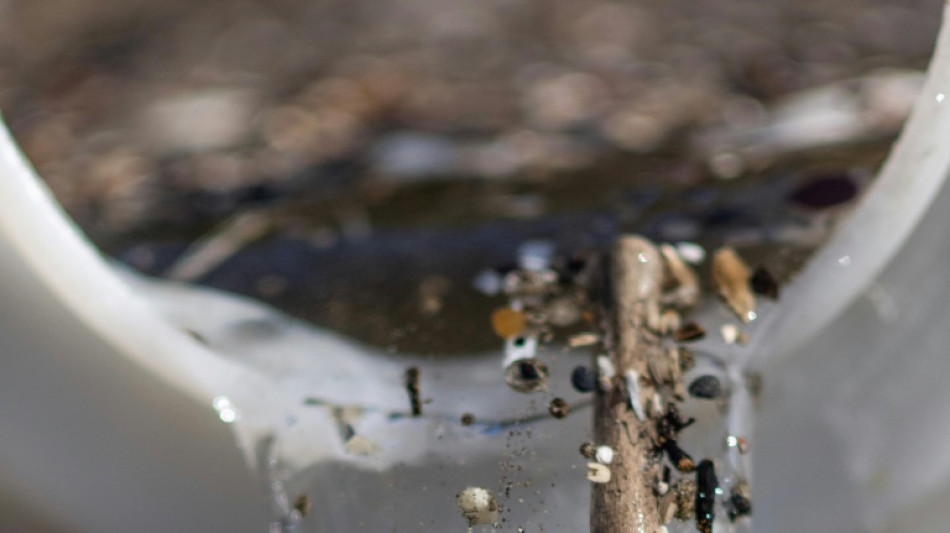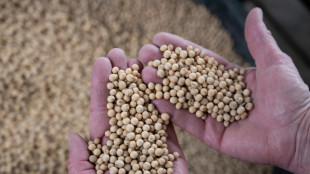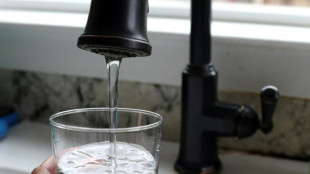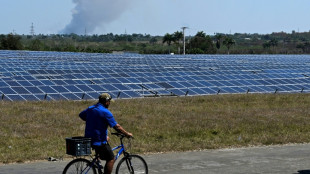
-
 Zelensky slams 'weak' US reply to Russian strike on his hometown
Zelensky slams 'weak' US reply to Russian strike on his hometown
-
Musiala hamstring tear compounds Bayern's injury crisis

-
 Selfies, goals and cheers at South Africa's grannies World Cup
Selfies, goals and cheers at South Africa's grannies World Cup
-
Tsunoda frustrated with 15th in Red Bull qualifying debut

-
 Rain forecast adds new element to combustible Japanese GP
Rain forecast adds new element to combustible Japanese GP
-
Ukraine mourns 18 killed in Russian missile strike

-
 Germany's Mueller to leave Bayern Munich after 25 years
Germany's Mueller to leave Bayern Munich after 25 years
-
India's Modi clinches defence, energy deals in Sri Lanka

-
 Verstappen snatches 'special' pole for Japan GP with lap record
Verstappen snatches 'special' pole for Japan GP with lap record
-
Cambodia hails opening of naval base renovated by China

-
 Verstappen snatches 'insane' pole for Japan GP in track record
Verstappen snatches 'insane' pole for Japan GP in track record
-
Thousands rally for South Korea's impeached ex-president Yoon

-
 New Zealand hammer Pakistan by 43 runs to sweep ODI series 3-0
New Zealand hammer Pakistan by 43 runs to sweep ODI series 3-0
-
Myanmar quake death toll passes 3,300: state media

-
 India's Modi in Sri Lanka for defence and energy deals
India's Modi in Sri Lanka for defence and energy deals
-
'No one to return to': Afghans fear Pakistan deportation

-
 Fractious Republicans seek unity over Trump tax cuts
Fractious Republicans seek unity over Trump tax cuts
-
America's passion for tariffs rarely pays off, economists warn

-
 Trump's global tariff takes effect in dramatic US trade shift
Trump's global tariff takes effect in dramatic US trade shift
-
North Korea's Kim fires new sniper rifle while visiting troops

-
 Norris fastest in McLaren 1-2 as fires again disrupt Japan GP practice
Norris fastest in McLaren 1-2 as fires again disrupt Japan GP practice
-
Vital European defence startups still facing hurdles

-
 'I don't have a voice in my head': Life with no inner monologue
'I don't have a voice in my head': Life with no inner monologue
-
Pakistan chasing 265 to win shortened third New Zealand ODI

-
 US soybeans, energy: Who is hit by China's tariff retaliation?
US soybeans, energy: Who is hit by China's tariff retaliation?
-
Green, Sengun lift Rockets over Thunder, Celtics clinch record

-
 Ariya downs defending champ Korda to advance at LPGA Match Play
Ariya downs defending champ Korda to advance at LPGA Match Play
-
Ovechkin ties Gretzky's all-time record of 894 NHL goals

-
 Under-pressure Doohan vows to learn from Japanese GP smash
Under-pressure Doohan vows to learn from Japanese GP smash
-
Harman goes four clear at Texas Open

-
 McLaughlin-Levrone, Thomas cruise to wins at opening Grand Slam Track
McLaughlin-Levrone, Thomas cruise to wins at opening Grand Slam Track
-
Russian strike kills 18 in Ukrainian president's home city

-
 US cardinal defrocked for sex abuse dies at 94
US cardinal defrocked for sex abuse dies at 94
-
Lula admits 'still a lot to do' for Indigenous Brazilians

-
 England, Germany and Spain on mark in women's Nations League
England, Germany and Spain on mark in women's Nations League
-
Bayern's Musiala to miss Inter first leg with injury

-
 Judge orders return to US of Salvadoran man deported in error
Judge orders return to US of Salvadoran man deported in error
-
'Class' Freeman eases Northampton past Clermont and into Champions Cup quarters

-
 Amadou of Malian blind music duo dies aged 70
Amadou of Malian blind music duo dies aged 70
-
Freeman hat-trick eases Northampton into Champions Cup quarters with Clermont win

-
 Defiant Trump dismisses stock market's tariff plunge
Defiant Trump dismisses stock market's tariff plunge
-
Musiala injury sours Bayern win at Augsburg

-
 Peruvian schoolkids living in fear of extortion gangs
Peruvian schoolkids living in fear of extortion gangs
-
Top seed Pegula rallies to oust defending champ Collins in Charleston

-
 Amadou of Malian blind music duo Amadou & Mariam dies aged 70
Amadou of Malian blind music duo Amadou & Mariam dies aged 70
-
California to defy Trump's tariffs to allay global trade fears

-
 Bayern's Musiala subbed off with injury days out from Inter clash
Bayern's Musiala subbed off with injury days out from Inter clash
-
Russian strike kills 16 in Ukraine leader's home city, children among dead

-
 NBA fines Grizzlies' Morant for imaginary gun gesture
NBA fines Grizzlies' Morant for imaginary gun gesture
-
Trump tariffs offer opportunity for China

| RBGPF | 100% | 69.02 | $ | |
| BCC | 0.85% | 95.44 | $ | |
| SCS | -0.56% | 10.68 | $ | |
| NGG | -5.25% | 65.93 | $ | |
| BCE | 0.22% | 22.71 | $ | |
| CMSD | 0.7% | 22.83 | $ | |
| RYCEF | -18.79% | 8.25 | $ | |
| VOD | -10.24% | 8.5 | $ | |
| RIO | -6.88% | 54.67 | $ | |
| RELX | -6.81% | 48.16 | $ | |
| CMSC | 0.13% | 22.29 | $ | |
| JRI | -7.19% | 11.96 | $ | |
| GSK | -6.79% | 36.53 | $ | |
| BTI | -5.17% | 39.86 | $ | |
| AZN | -7.98% | 68.46 | $ | |
| BP | -10.43% | 28.38 | $ |

How harmful are microplastics to human health?
Microplastics have been found throughout the human body -- including inside lungs, blood and brains -- and while it is not yet clear how harmful they are to our health, some researchers are sounding the alarm.
These tiny pieces of plastic have been detected almost everywhere on Earth, from the deepest oceans to the highest mountains, as well as in the air, water, soil and food chain.
Every day humans ingest, inhale or otherwise come in contact with microplastics, which are less than five millimetres (0.2 inches) and mostly invisible to the naked eye.
"A human in 2024 has plastic in almost all the organs of their body," French specialist researcher Fabienne Lagarde recently told a hearing of France's parliament.
"And it will probably be even worse for the children born in 2040," she added.
Numerous studies have linked the presence of microplastics -- or nanoplastics which are 1,000 times smaller -- to a range of health problems.
In March, a study in the New England Journal of Medicine found an association between microplastics accumulating in people's blood vessels and an increased risk of heart attack, stroke or even early death.
- 'Red flag' -
"The body of research on microplastics is growing and it is already showing us that the health impacts are very concerning," said Tracey Woodruff, a researcher at the University of California, San Francisco.
Woodruff recently conducted a systematic review of 2,000 previous studies on animals, finding that microplastics "can harm fertility, are linked to increased cancer risk and can harm respiratory health," she told AFP.
It is a "red flag" that microplastics have been found in so many areas of the body "including the brain, testes and even crossing the placenta into the foetus," she added.
Many of the most worrying studies, such as the one from March, have been observational. This means they cannot prove microplastics are directly causing the health problems they have been linked to.
Others have been conducted in the lab, sometimes testing on animals, which some observers see as a limitation.
For the studies she reviewed, Woodruff said the biological systems of the animals were "quite similar to humans".
She added that "data from animals has been used to identify carcinogens and reproductive toxicants for decades."
Many things remain unknown about how microplastics could affect health, including the role played by their size, shape and composition.
Many plastics are a complex cocktail of polymers and chemicals, and there are fears they could smuggle in other contaminants in what is called the "Trojan Horse" effect.
- Plastic pollution treaty? -
Out of the more than 16,000 chemicals used or found in commercial plastic, more than a quarter are considered hazardous to human health, according to a group called the Scientists' Coalition for an Effective Plastics Treaty.
Linked health concerns include "infertility, obesity and non-communicable diseases including diabetes, cardiovascular disease and many cancers," the group said.
How damaging all this tiny plastic is to health also depends on how much humans are exposed to, which also remains unclear.
A report from the World Wildlife Fund made headlines in 2019 by estimating that people ingest around five grams of plastic a week, the equivalent of a credit card.
The methodology and results of the report have since been called into question, with numerous studies estimating lower levels of ingested plastic -- and showing that rates vary hugely across the world.
It is still early days for the field, with research into how microplastics impact health only beginning in the early 2000s.
"Despite the newness of the topic and the limitations that have been identified, the dangers linked to oral exposure and inhalation are there," Muriel Mercier-Bonin, a researcher at France's INRAE institute, told the French parliament.
And the problem is only growing. Plastic production has doubled in 20 years and at current rates could triple by 2060, according to the OECD.
The United Nations has agreed to work towards a world-first treaty to reduce plastic pollution, with negotiators meeting in a month for a final round of talks.
In the meantime, experts recommend people limit their exposure to microplastics by avoiding plastic bottles, not heating food in plastic containers, wearing clothes made of natural material and ventilating their home.
F.Pedersen--AMWN



